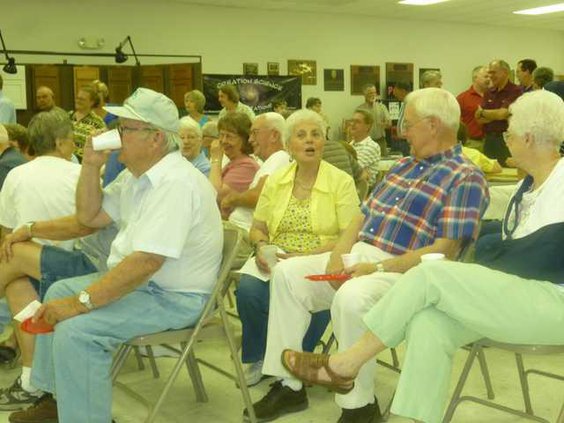By Jim Misunas
jmisunas@gbtribune.com
LARNED — Retired Kansas Public Employees Retirement System (KPERS) employees don’t have to worry about future benefits.
But current and future KPERS enrollees will pay a higher contribution and will likely receive lower future benefits, according to a local legislator.
Rep. Mitch Holmes, R-St. John, outlined issues with KPERS facing a $8.3 billion unfunded liability through 2033. Holmes is co-chair for the House Committee on Pensions and Benefits. He visited with Pawnee County citizens regarding KPERS issues during a legislative meeting Thursday. There were several dozen people who acknowledged they were part of the KPERS retirement package Thursday.
Holmes has spent much of his time working with the House Committee. He said the legislature is doing the responsible thing dealing with the underfunding of KPERS.
“I’ve been working on it so long, I’ve ate, drank, slept and had dreams about KPERS. Some people’s biggest fear is we would change the past 30 years, but nothing is retroactive,” Holmes said. “It will not affect anything today. That was never on the table.”
KPERS’ investments showed losses in 2008 and 2009 before rebounding the past two years.
Holmes said the lack of sufficient funding for money owed to retired employees started years ago when contributions by employees and the state of Kansas didn’t match the final retirement payout. The retirement guarantee was always too high based on employee contributions and state funding.
“The problems go way back,” he said. “Ever since 1993, contributions have not matched the benefits passed out. Employee and state contributions should be increased.”
The legislature approved a measure to boost the state’s annual contributions to the KPERS system starting in July 2013, phasing in a $28 million annual increase over four years.
The plan will require public employees to choose between paying more of their salaries toward their retirement benefits and having their future benefits cut. A commission is studying whether the state should move toward a 401(k)-style plan.
Holmes said the commission features several legislators and several financial managers on the group.
Supporters of moving to a 401(k)-style plan contend the state of Kansas can’t sustain traditional KPERS plans, which guarantee benefits up front based on a worker’s salary and years of service. They argue that until benefits are based on investment earnings, as they are in a 401(k) plan, each new employee adds to the pension system’s long-term funding problem.
KPERS’ defined-benefit plan covers state employees, public school staff members, local government workers, police officers, firefighters and judges.
State legislators like Holmes are blessed with one of the state’s best retirement packages.
A legislator retiring with an annualized pay of $85,820 with 10 years of service would enjoy an annual KPERS benefit of $15,018, according to KPERS. A retiring legislator with 20 years of service would receive an annual benefit of $30,037. KPERS’ guaranteed benefits are more generous than private sector plans. Unlike private sector retirement plans, KPERS payments are not subject to state income tax. Few private sector employees can retire with 50 to 80 percent of their highest earnings.
More than 275,000 Kansans participate in KPERS, which sits on an $11.2 billion portfolio. KPERS has averaged passing out more than $1 billion annually in benefits. Glenn Deck serves as executive director of KPERS.
St. John legislator works with KPERS' issues
KPERS' system faces lack of sufficient funding




